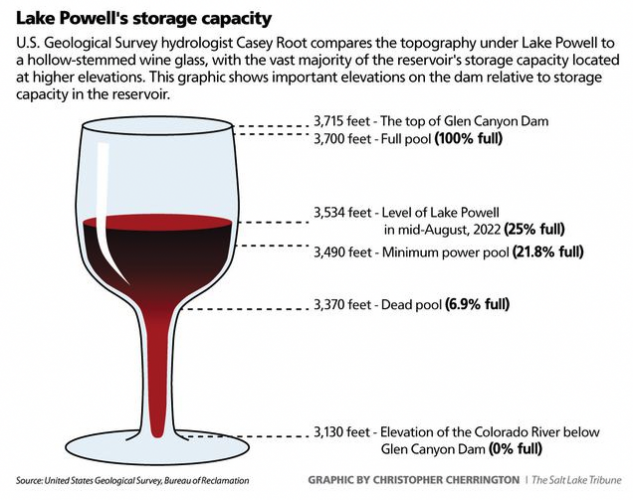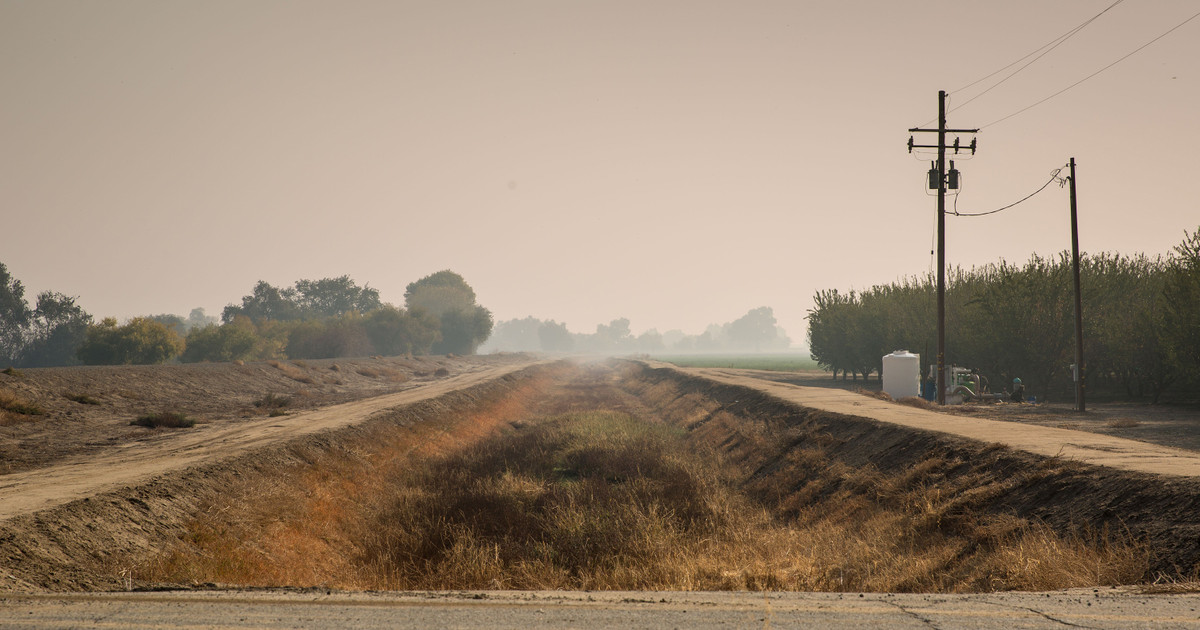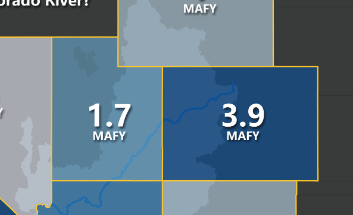Yep. Always been a tricky part of "fish" releases too.
Well, as long as gvwua is taking it for a beneficial use the DE should
(Maybe emphasis on “should”?) be able to get it there
We/I just had to coordinate another one of those yesterday
Follow along with the video below to see how to install our site as a web app on your home screen.
Note: This feature may not be available in some browsers.
Yep. Always been a tricky part of "fish" releases too.
"Last month, the Department of the Interior notified the seven western states that depend on Colorado River water that they must devise a way to conserve up to 4 million acre-feet of water in 2023 — more than Arizona and Nevada’s share combined -- or face federal intervention."
Here we are, two months later, and nothing substantive has happened. Pretty good letter from Entsminger to DOI and BOR at the bottom of this article.
But they haven't had 62 days, they've had decades, and have failed to do anything substantial to address the issue. But then again, being proactive never pays...I read that letter yesterday, I was surprised by it, almost entirely.
"To the broader river community, I say this: The Law of Mass Balance dictates that the Colorado River cannot provide enough water for the current level of use. The magnitude of the problem is so large that every single water user in every single sector must contribute solutions to this problem regardless of the priority system. The math is simple, even if the law and the politics are not: the bulk of the responsibility to reduce use falls upon water users downstream of Hoover Dam, because that is where the bulk of the water is used."
A lower basin state placing bulk responsibility on.... lower basin states? Surprising, yet true, IMO.
I like the call out on these "drought profiteering proposals" too.
Granted, I would argue nobody, not even the upper and lower river commissions should be expected to solve the problem and make tangible progress in 62 days. Proposals and plans that make sense as a start, yes.
but man, such a complicated beast it can't be solved in two months.
But they haven't had 62 days, they've had decades, and have failed to do anything substantial to address the issue. But then again, being proactive never pays...
If society has to weight in, I think they'll look at all the irrigated corn/grass/alfalfa in CO and find a "solution" that CO farmers aren't going to like.the upper basin states have a role in this, but in some contexts, this is not our problem and we are not why the lake levels are falling.
If society has to weight in, I think they'll look at all the irrigated corn/grass/alfalfa in CO and find a "solution" that CO farmers aren't going to like.
Yes, those areas too. But no corn farmer will be outside of the scorn of the public's eye.i personally feel that society will have a little more scorn in their eyes over the alfalfa being grown in the mojave than the alfalfa being grown in the yampa or even the grand valley in colorado.
Which is also sorta why we're here, because the basic idea of that until we're forced to, we're not going to be proactive. I mean I get where the upper is coming from, a place of "fairness" and "lawfulness" but their definition of fair, may not hold much water in the end.i mean we're still talking about a nearly 2-fold+ difference in colorado river depletions between upper and lower when the apportionment between upper and lower is equal. one (we all know who) is even over apportionment in their depletions - though, they would argue they're not when you just measure "use" rather than system-wide depletion - and the other is far under apportionment. it is for many reasons, but especially that one, that the upper river commission's official letter to DOI and Commissioner Touton basically stated "we'll work on being more water wise for sure, but until we're in breach of compact compliance we're not doing chit"
Which is also sorta why we're here, because the basic idea of that until we're forced to, we're not going to be proactive. I mean I get where the upper is coming from, a place of "fairness" and "lawfulness" but their definition of fair, may not hold much water in the end.
If the elevation drops the same amount this year it would reach 3,503', only 13' above the level at which the dam can no longer produce electricity. (I'm not sure about the effect of the "bathtub" shape of the reservoir and reduced AF/ft at lower elevation.)

If society has to weight in, I think they'll look at all the irrigated corn/grass/alfalfa in CO and find a "solution" that CO farmers aren't going to like.

In Vegas for tradeshow a few weeks ago it feels like the band playing on Titanic.It looks like BOR is planning to take greater control of the spigots on Glen Canyon and Hoover.
Interior Department Initiates Significant Action to Protect Colorado River System
Interesting article (1st of a series) in the SL Tribune here. It says subscribers only, but I, a non subscriber, was able to read it.If society has to weight in, I think they'll look at all the irrigated corn/grass/alfalfa in CO and find a "solution" that CO farmers aren't going to like.
I've heard that about a lot of our ag up and down the west coast. Everything from hay to apples. Certainly doesn't have great optics.Interesting article (1st of a series) in the SL Tribune here. It says subscribers only, but I, a non subscriber, was able to read it.
It says 68% of diverted water in Utah goes to alfalfa and hay production. Of that production, 29% is shipped overseas.

Have a link for that clip? I’d like to look at the data.I've heard that about a lot of our ag up and down the west coast. Everything from hay to apples. Certainly doesn't have great optics.
View attachment 253020
You'll have to rabbit hole a bit for the data I suspectHave a link for that clip? I’d like to look at the data.
Thanks!You'll have to rabbit hole a bit for the data I suspect